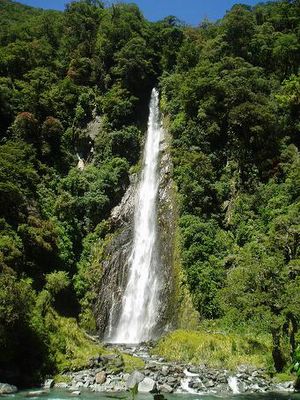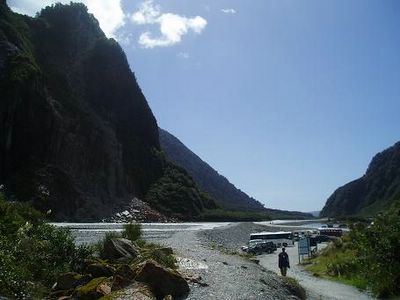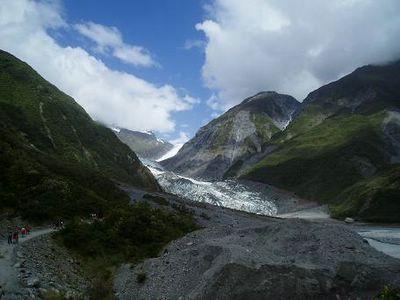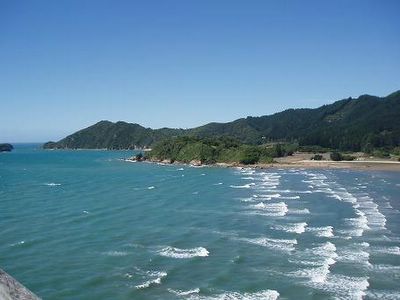Into the west and through the immensity of the Haast Pass around us on either side, waterfalls gushing amongst the dense forest.

Then the west coast a curious mixture of lengthy, wild grey beaches strewn with driftwood logs and them vast areas over hills of native tree forest/bush.

I picked a small driftwood piece and felt the smoothness that had been given it by the pounding sea. In the immensity of the beach there was a moment to find some quiet. All this newness was stimulating to all the senses. As we traveled it didn’t seem to matter where we were placed or rooted, I felt so caught up in the thrill of exploring and sesing each new place we encountered, even what we might say seemed like the middle of ‘no where’.
A visit up the the Fox Galcier saw us pass signs giving dates of when it was at point x or y and now the distance cvovered to the face of it. To simply look up and see the carved rocks that were huge edifaces, somewaht cathedral like rising sheer upwards... it was overwhelming.


Children need ‘wild’ places. Perhaps we all recovered a sense of that and enjoyed it. No longer did being in a ‘strange’ new land feel as overwhelming. Children in the way they roam break the boundaries between themselves and the world in which they move, no matter their space they are in… imagination helps create this as they can make the place their own for that time. Into the west had a sense of this, as well as a curious mix of intimacy and immensity.
Preparing for Ecclesiastes tomorrow in church, it strikes me that Qoheleth somewhat soberingly makes a call to gather the people and seeks to rid them of illusion, falsehood, fraud and sentimentality, holding up a mirror and more perhaps to enable the people to engage faith with reality, in a very disillusioned context. In the face of those who offer a chummy God who is rather banal /reduced, and hence people's faith is more a quiet resignation. Qoheleth voices a more robust faith affirming the holiness, the awesomness the other-ness of the God of Israel who is the centre of everything we are, we have and we do without such a faith God's care, love, joy - God's YES to us and our 'yes' response are empty, vanity, illusion, fraud, or as Zimmerman says is 'flatulence'. How do we see God today? Can we live with what for us may feel like paradox, a God who is 'other' and evokes awesome fear and intimacy as we know and experience it in Christ ?
Gaston Bachelard in
Poetics of Space philosophically explores intimate experiences of place. In Chpt 5 on
shells (pp105-135) he aims to open up an understanding of ‘
intimacy and immensity’.
‘To imagine living in a seashell, to live withdrawn into one’s shell, is to accept solitude – and to embrace, even momentarily, the whole concept and tradition of miniature, in shrinking enough to be contained in something as tiny as a seashell…’ (Foreword o the 1984 edition p. viii)
Psalm 91 v2
'Say this:' God, you are my refuge, I trust in you and I am safe.'
.jpg)








